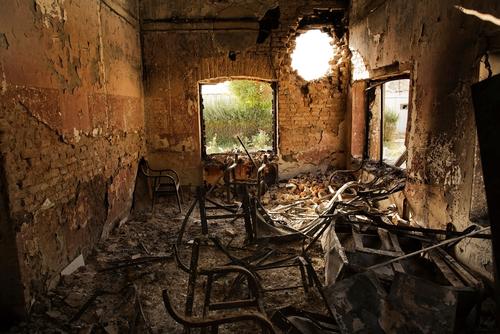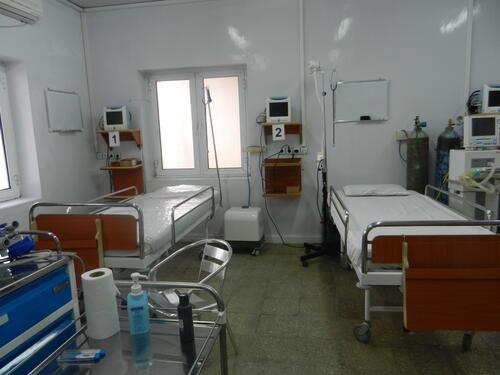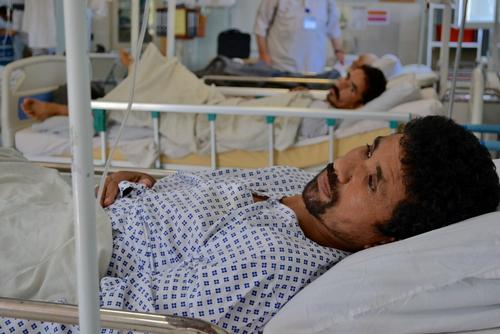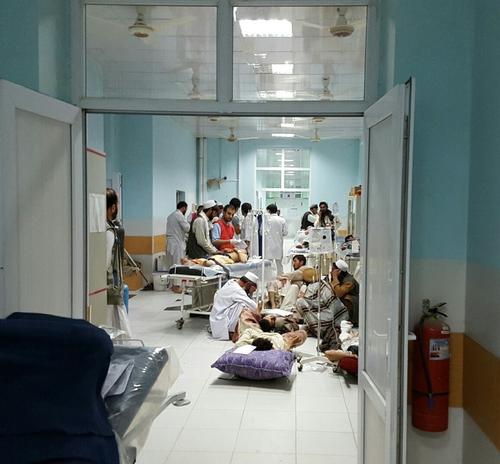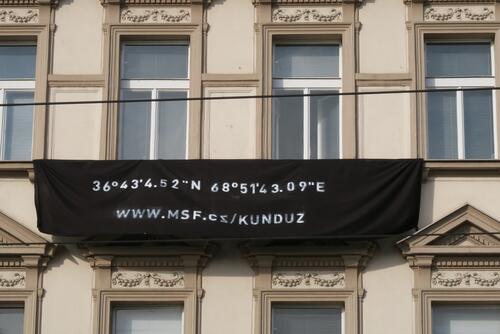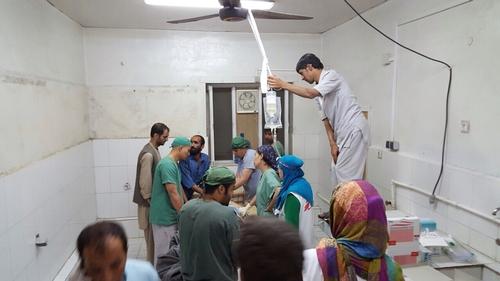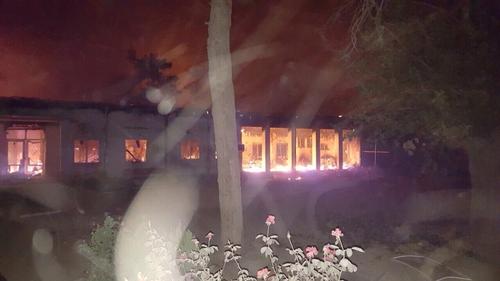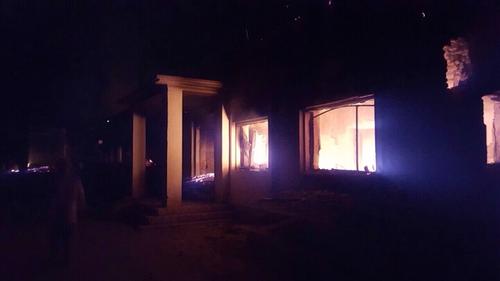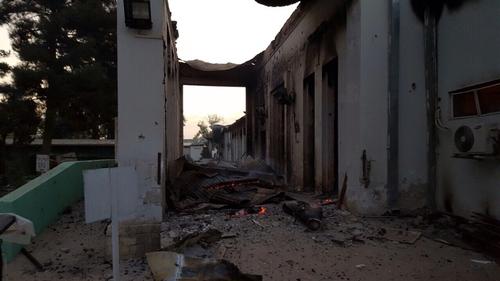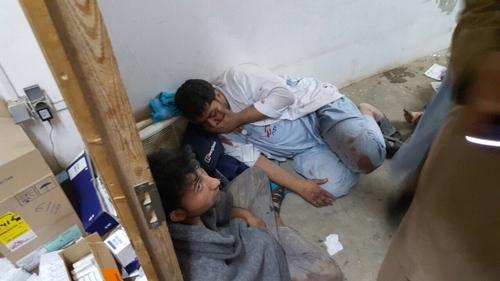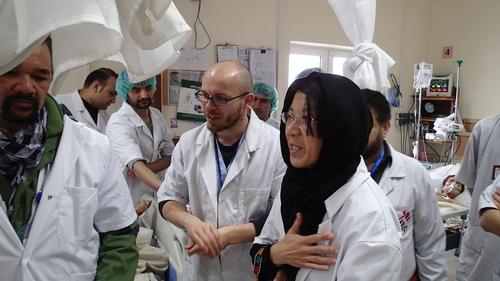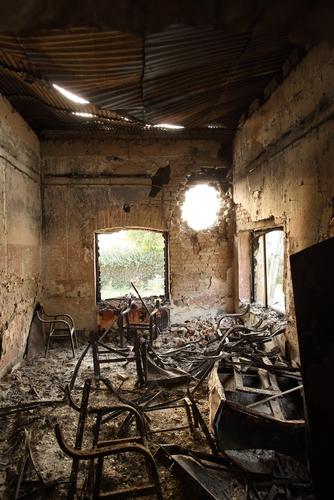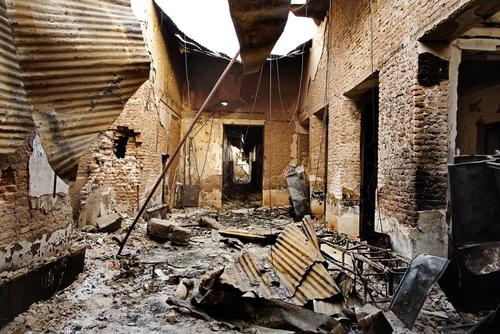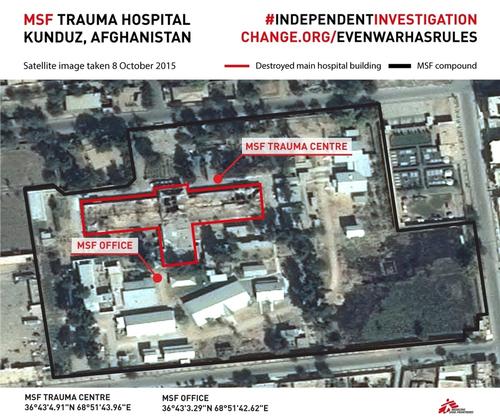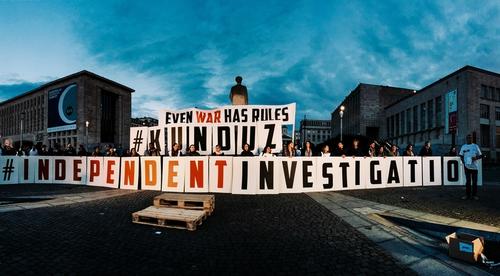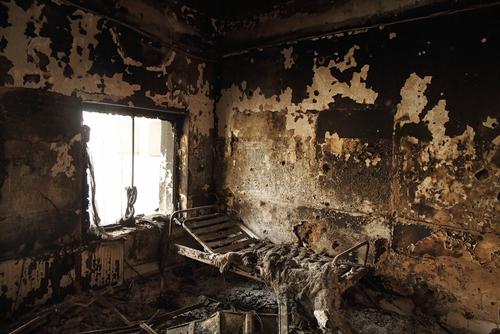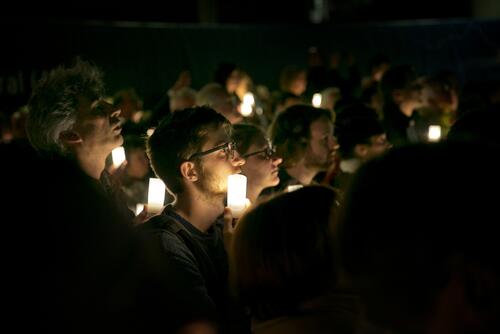In August 2011, we opened a trauma hospital in the northern Afghan city of Kunduz. The hospital provided high-quality, free surgical care to victims of all types of trauma.
Starting with converting shipping containers, our hospital soon moved into a building in the city centre. By the time of the airstrikes in October 2015, the hospital was equipped with 92 beds, an emergency room, two operating theatres, an intensive care unit, an outpatient department, mental health and physiotherapy wards, as well as X-ray and laboratory facilities.
Our teams also invested heavily in local recruitment and training of medical staff.
A lifeline for people
Our hospital was the only facility of its kind in northeastern Afghanistan; beforehand, severely injured people were forced to make long and dangerous journeys to the capital Kabul or Pakistan to receive the care they needed.
Since opening the hospital in 2011, more than 15,000 surgeries were conducted and more than 68,000 emergency patients were treated.
In only a few years, the hospital had become a life-line for people in Kunduz and the surrounding provinces.
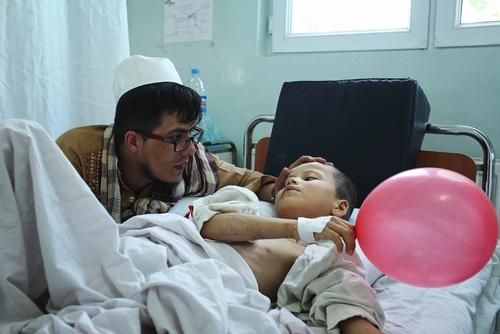
Hospital in the crossfire
Throughout September 2015, fighting between government and opposition forces became more intense and shifted to Kunduz city itself.
On 28 September 2015, our hospital was suddenly in the middle of a quickly shifting frontline when the armed opposition launched a takeover of Kunduz city.
The team was overwhelmed with hundreds of wounded patients. In the five days leading up to the attack, our teams in Kunduz had treated 376 patients in the emergency room.
On the night of the attack, there were 105 patients in the hospital and 140 of our international and national staff were present, of whom 80 were on duty.
Attack from the air
Starting at 2:08am on Saturday 3 October, a United States AC-130 gunship fired 211 shells on the main hospital building where patients were sleeping in their beds or being operated on in the operating theatre.
At least 42 people were killed, including 24 patients, 14 staff and 4 caretakers. Thirty-seven people were injured.
Our patients burned in their beds, our medical staff were decapitated or lost limbs. Others were shot from the air while they fled the burning building.
The attack from the air lasted for around one hour. The main hospital building came under precise and repeated airstrikes, while the surrounding buildings were left mostly untouched.
Throughout the airstrikes our teams desperately called military authorities to stop the attack.
Aftermath
In the aftermath of the attack, our team tried to move wounded and ill patients out of harm’s way. They tried to save the lives of wounded colleagues and patients after setting up a makeshift operating theatre in an undamaged room.
In the days after the attack, the United States military eventually claimed responsibility for the airstrikes, saying that it had been an accident.
The US military claimed they had received reports that the hospital building was holding active Taliban militia. Our staff reported no armed combatants or fighting in the compound prior to the airstrike.
As in all our projects, our doctors treat people according to their medical needs and do not make distinctions based on a patient’s ethnicity, religious beliefs, political affiliation or on which side of a conflict they're from.
At the time of the strikes, a small number of wounded - and therefore non-combatant - Taliban militia were being treated at the hospital, as were a number of government forces.
The view from inside the hospital is that this attack was conducted with a purpose to kill and destroy. But we don’t know why.Christopher Stokes, MSF General Director
Independent investigation
The attacks took place despite the fact that we had provided the GPS coordinates of the trauma hospital to the US Department of Defense, Afghan Ministry of Interior and Defense, and US Army in Kabul as recently as Tuesday, 29 September.
While both the US and Afghan armies both conducted and released their own investigation and findings, we were not satisfied that an independent, impartial investigation could be carried out by the parties involved.
Given this, and the lack of details and information in the lead up to, and surrounding, the airstrikes, we demanded an independent investigation on the attack.
We asked the International Humanitarian Fact-Finding Commission to establish the facts of this event. Created in 1991 under the Geneva Conventions that govern the rules of war, the IHFCC is not a UN body. The IHFCC is set up for precisely to independently investigate violations of humanitarian law, such as attacks on hospitals, which are protected in conflict zones.
In November 2015, we released our own internal review into the attack.
The attack destroyed our ability to treat patients at a time of their greatest need. A functioning hospital caring for patients cannot simply lose its protected status and be attacked.Dr. Joanne Liu, international president of MSF
Access to care today in Kunduz
Nearly four years after the destruction of our Kunduz Trauma Centre, the need for life-saving trauma care is extremely high in Kunduz and the availability of free, quality medical care is still very low.
The security situation remains volatile and the medical needs will continue to grow.
Following the attack, we engaged in discussions with all parties to the conflict over a one and half year period and finalised formal commitments that allow us to gradually start to provide medical care in Kunduz.
We have explicit commitments that our staff, patients and hospitals will not be attacked and that we can treat every person who needs medical care, no matter their ethnicity, political affiliations or which side of the conflict they are on.
We know there are no full guarantees when working in an active conflict, but we believe that the thorough negotiation process and the commitments we have obtained allow us to move forward and work again in Kunduz, while managing the risks that come with providing trauma care in this context.
Re-starting in Kunduz is a step-by-step process – as a first step, in July 2017 we opened an outpatient clinic for people with minor trauma-related wounds and injuries.
We've also started construction on a new trauma hospital in Kunduz city; however, the COVID-19 pandemic temporarily put construction on hold and it will now open later in 2021.
In memorium
We continue to grieve and mourn the loss of our colleagues and patients. Our 14 colleagues who died in the attack are greatly missed and will never be forgotten.
- Abdul Maqsood Abdul was 22-years-old and worked as a patient information focal point.
- Abdul Nasir Aged 22, Abdul was a hospital cleaner.
- Abdul Salam Friendly and easy going, Abdul, 29, was a nurse in the operating theatre.
- Abdul Satar Zaheer At age 47, Abdul was a doctor and the Deputy Medical Director at MSF’s Kunduz Trauma Centre.
- Aminullah Bajawri Aminullah was a 32-year-old father and emergency room (ER) doctor.
- Lal Mohammad Lal was 28-years-old and was like a mentor to the younger nurses.
- Mohammad Ehsan Osmani Aged 32, Dr Osmani was a young intensive care unit doctor with extraordinary enthusiasm and dedication to his patients.
- Mohibullah Aged 38, Mohibullah was a dedicated father and an experienced emergency room nurse who joined the Kunduz Trauma Centre three years before the attack.
- Najibullah Najibullah was a 27-year-old father, and had been working for MSF since August 2011 as a cleaner in the emergency room.
- Naseer Ahmad Aged 23, Naseer was an intensive care unit (ICU) nurse who began working with MSF in June 2014.
- Shafiqullah Aged 39, Shafiqullah had been working as a guard since February 2015.
- Tahseel Tahseel was a 35 year old father and a much loved and valued member of the pharmacy team at the Kunduz Trauma Centre since the opening of the project.
- Zabiullah Aged 29, Zabiullah was married and had been working as a guard in the hospital since February 2015.
- Ziaurahman was a 23-year-old intensive care unit (ICU) nurse, who had been working for MSF since December 2013.



